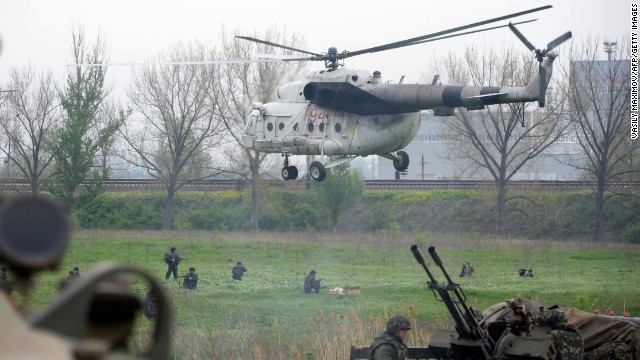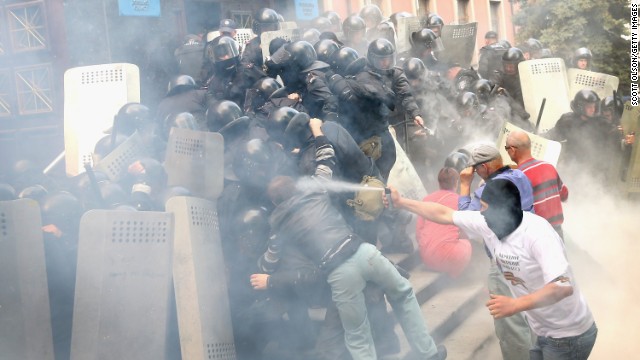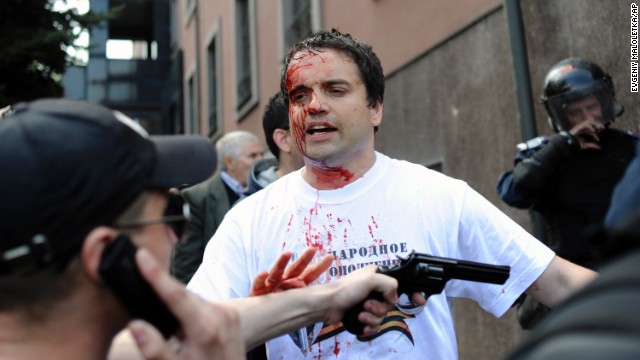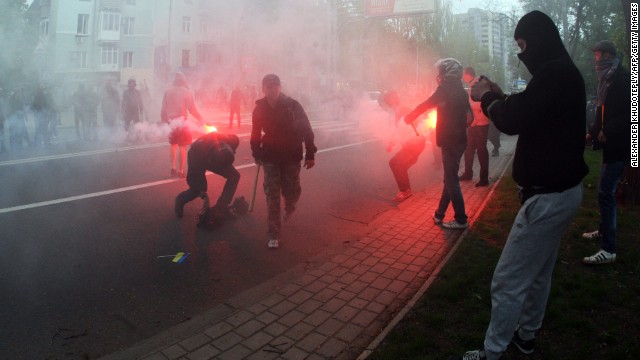


 Deadly street fighting, helicopters shot down and civilians being used as human shields.
Deadly street fighting, helicopters shot down and civilians being used as human shields.
That was the picture that
emerged Friday in southern Ukraine as violence escalated amid reports
that dozens of people were killed in a fire and still more were shot
dead or wounded in street fighting, raising the question of whether the
country can stave off a possible civil war.
The violence -- pitting
pro-Russian separatists against Ukrainian forces and those who support
the government in Kiev -- prompted an emergency meeting of the U.N.
Security Council, with Russia demanding an end to what it called
Ukrainian aggression and Western powers accusing Moscow of funding the
violence.
Russia and the West have
squared off diplomatically over the fate of Ukraine, after Moscow
annexed Crimea in March following the ouster of Ukrainian President
Viktor Yanukovych. He was pushed from office after months of protests by
people upset that he had turned away from Europe in favor of Russia.
The crisis in eastern
Ukraine hit a boiling point with news Friday that security forces
launched their most intensive effort yet to try to dislodge pro-Russian
separatists, who have reportedly seized a number of government buildings
in nearly a dozen cities and towns.
Helicopters downed
Two Ukrainian government
helicopters were shot down in the flashpoint city of Slavyansk. The
helicopters were brought down by fire from pro-Russian separatists, the
Ukraine Ministry of Defense said.
Five pro-Russian
separatists and two civilians were killed in Slavyansk in a Ukrainian
military operation, the city's self-declared mayor, Vyacheslav
Ponomaryov.
Two Ukrainian soldiers
were killed during an attack in the village of Andriyivka, near
Slavyansk, defense ministry said. The gunmen also blocked a bridge in
the area, using local residents, including women, as shields, according
to the ministry.
Hundreds of miles away,
in the Black Sea city of Odessa, at least four people were killed and 40
were wounded in fighting, according to the regional police
administration.
Another 31 people died
after a fire was started at a trade union building amid clashes in the
largely Russian-speaking Odessa, police said. Authorities initially
reported 38 people had died, but later revised it.
Video posted on YouTube
appeared to show Molotov cocktails being thrown by Kiev supporters at
the building where pro-Russian separatists had reportedly taken up
positions.
The footage, which CNN
could not independently confirm, showed people sitting on ledges trying
to escape the fire and thick smoke.
CNN cannot independently confirm the casualty counts.
The United States condemned the violence that led to the fire.
"The violence and mayhem
that led to so many senseless deaths and injuries is unacceptable,"
Marie Harf, a U.S. State Department spokeswoman, said.
The events that led to the fire "underscore the need for an immediate de-escalation of tensions in Ukraine," Harf said.
The violence came the
same day that U.S. President Barack Obama and German Chancellor Angela
Merkel pledged to seek harsher sanctions against Russia if Ukraine
doesn't stabilize in time for elections this month.
The two leaders warned Russia could face a new round of sanctions by the West, if it does not stop its actions in Ukraine.
"There just has not been
the kind of honesty and credibility about the situation there and the
willingness to engage seriously" in finding a diplomatic solution, Obama
said.
But the threat seemed to
do little to waive off Russia, with its Foreign Ministry saying
Ukraine's use of its military in Slavyansk is criminal.
'Nail in the coffin'
Russian President
Vladimir Putin's spokesman, Dmitry Peskov, told CNN the military
operation was "the last nail in the coffin" for the deal agreed to last
month in Geneva, Switzerland, which called for illegal militia groups in
eastern Ukraine to disarm and vacate seized buildings.
Putin has been kept fully informed of unfolding events and regards the situation with "grave concern," Peskov said.
What's not yet clear is
whether the escalating violence may prompt a response by Russia, which
has previously said it has the right to intervene in Ukraine to protect
Russian speakers.
Besides the threat from pro-Russian separatists, NATO estimates that Russia has some 40,000 troops massed near Ukraine's border.
Negotiations complicated
Peskov said the
Ukrainian operation also complicated ongoing negotiations to free seven
Western observers from the Organization for Security and Co-operation in
Europe, who have been held captive by separatists in Slavyansk for the
past week.
Russia's Foreign
Ministry, meanwhile, raised concern about the safety of a special
presidential envoy, Vladimir Lukin, sent to southeastern Ukraine to
negotiate a possible release of the OSCE observers.
Its statement cited
"reports about English-speaking foreigners spotted among attackers,"
saying there should be no "external interference" in Ukraine's affairs.
As the diplomatic
wrangling continued, residents of Slavyansk were warned Friday to stay
home and avoid windows as the latest phase of the authorities'
"anti-terrorist operation" got under way.
The two Mi24 helicopters
were downed with mobile air defense systems, killing two military
officers and injuring others, according to the Ukrainian Defense
Ministry website. Another army helicopter, an Mi8, was damaged, but no
one was hurt, it said.
Pro-Russian separatists
took one badly injured pilot hostage after his helicopter was forced to
make an emergency landing, the ministry said, and efforts to free him
are ongoing.
Ukraine's security service, the SBU, said one helicopter that came under attack was carrying medics, one of whom was injured.
Russian state news agency RIA Novosti earlier reported that one Russian separatist was killed and another wounded in Slavyansk.
The operation also targeted the town of Kramatorsk.
Meanwhile, Russian
airline Aeroflot said it was canceling flights Friday to the eastern
cities of Kharkiv and Donetsk because it didn't have permission to enter
Ukrainian airspace.
Human shield allegation
In his Facebook post,
Arsen Avakov, the Ukrainian interior minister, said nine checkpoints
that were under control of pro-Russian separatists in Slavyansk have
been taken back by Ukrainian forces, who now encircle the town.
What the Ukrainian
authorities want from the separatists has not changed, he said --
release the hostages, turn in weapons, vacate seized administrative
buildings and allow the normal functioning of the city.
Ukraine's security
service also accused separatist leaders of ordering separatists to use
residents as human shields in the city and at checkpoints.
Acting Ukrainian
President Oleksandr Turchynov acknowledged this week that the central
government has effectively lost control of the country's Donetsk and
Luhansk regions to the pro-Russian separatists.
He signed a decree
introducing military conscription Thursday in a bid to beef up Ukraine's
military, citing "real and potential threats to Ukraine."
No comments:
Post a Comment